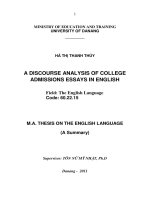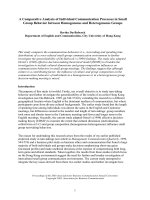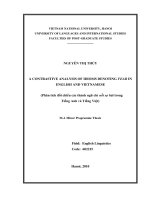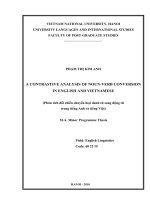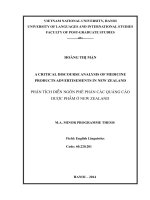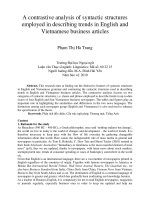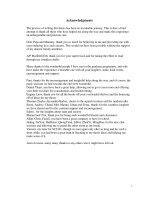A discourse analysis of volunteer recruitment appeals in english (tt)
Bạn đang xem bản rút gọn của tài liệu. Xem và tải ngay bản đầy đủ của tài liệu tại đây (896.76 KB, 25 trang )
THE UNIVERSITY OF DANANG
UNIVERSITY OF FOREIGN LANGUAGE STUDIES
NGUYỄN MINH TRƯỜNG
A DISCOURSE ANALYSIS OF VOLUNTER
RECRUITMENT APPEALS IN ENGLISH
Major : ENGLISH LINGUISTICS
Code : 8.22.02.01
MASTER THESIS IN FOREIGN LANGUAGES,
LITERATURE AND CULTURE
(A SUMMARY)
Danang, 2018
This thesis has been completed at University of Foreign Language
Studies, The University of Da Nang.
Supervisor: Assoc. Prof. Dr. Nguyễn Thị Quỳnh Hoa
Examiner 1: Assoc. Prof. Dr Trần Hữu Phước
Examiner 2: Assoc. Prof. Dr Nguyễn Tất Thắng
The thesis was orally defended at the Examining Committee
Time :27/10/ 2018
Venue: University of Foreign Language Studies
- The University of Da Nang
This thesis is available for the purpose of reference at:
- Library of University of Foreign Language Studies, The University
of Da Nang
1
CHAPTER 1
INTRODUCTION
1.1. RATIONALE
With the development of the society nowadays, humans are
heavily affected by general disasters such as, health, traffic, warfare
and natural particularly. In face of these problems, there are many
organizations appear to call the volunteers to help people over their
pains. Volunteer activities have become a crucial part in recruitment
appeals of organizations. The main purpose of appeals is to call the
people to join hand to do meaningful work. In order to achieve that
purpose, most appeals make good use of language.
In order to make a good appeal, the writers have to provide clear
and specific information for the people. Then, they have to take into
consideration how their appeals are written. The more attractive and
persuasive their recruitment appeals are, the more likely participants
are to make decisions to join with their appeals.
To the readers, before choosing the best organizations, they have a
look to carefully read the appeals’ information. Moreover, the readers
would tend to seek for more details of the organizations on the mass
media such as newspapers, magazines, TV or websites on the internet
before joining with the appeal.
Volunteer Recruitment Appeals (VRAs) often appear on the
homepages of the official websites in English so that it can attract
people’s attention many benefactor. Any type of appeal is attached to
a communicative situation. A clear and attractive VRA is able to help
a firm make a strong impression on their participants and persuade
them to spend time and money on its own appeals. However, the task
of writing such an effective text to send the condensed message to as
2
well as convince participants is never easy. It requires the profound
knowledge of linguistics such as syntax, lexicology, stylistics,
pragmatics, semantics, and other elements
( Source: />For the above reasons, “A Discourse Analysis of Volunteer
Recruitment Appeals in English” is carried out with the hope that
this study’s result will provide some useful practical knowledge of
volunteer recruitment appeals. In addition, this study will probably
bring students and teachers of English an overview of the language of
A discourse analysis of Volunteer Recruitment Appeals in English
(VRAEs) as well as those who are interested in this field.
3
1.2. AIMS AND OBJECTIVES OF THE STUDY
1.2.1. Aims of the study
This study aims to identify and describe the discourse features
of Volunteer Recruitment Appeals in English. The results of research
may help Vietnamese learners of English get an insight into the
distinctive characteristics of VRAs.
1.2.2. Objectives of the study
The objectives of the study are:
- To provide an analysis of discourse features of English
Volunteer Recruitment Appeals in terms of the layout, syntactic
structures, lexical choices and cohesive devices.
- To suggest some applications for learners of English, teachers
as well as copywriters in writing volunteer recruitment work.
1.3. RESEARCH QUESTIONS
To achieve the aims and objectives of the study, the following
research questions:
1. What are layout features of Volunteer Recruitment Appeals
in English?
2. What syntactic structures and lexical choices are used in
Volunteer Recruitment Appeals in English?
3. What are cohesive devices used in English Volunteer
Recruitment Appeals?
1.4. SCOPE OF THE STUDY
Volunteer Recruitment Appeals, in nature, are a complex
discourse genre in terms of forms, contents, length and linguistic
features; therefore, this discourse analysis is “selective” rather than
“exhaustive”. That is, I do not try to cover all discourse features of
Volunteer Recruitment Appeals. Rather, the study is restricted to
4
some discourse features such as syntactic structures, lexical features
and cohesive devices of written English and English Volunteer
Recruitment Appeals collected from office website in English from
2015 to 2017. Because of the limitation of the time and knowledge, I
can not target to all the aspects related to the Volunteer Recruitment
Appeals. I only focus on natural disaster appeals.
1.5. SIGNIFICANCE OF THE STUDY
It is hoped that the thesis can make a small contribution to
knowledge or understanding of discourse features of Volunteer
Recruitment Appeals in English. The research result can help
Vietnamese learners, teachers of English and the people who
interested in the area under investigation in the way that it provides
them with useful knowledge of Volunteer Recruitment Appeals
1.6. ORGANIZATION OF THE STUDY
The study consists of five chapters as follows:
Chapter 1. Introduction
Chapter 2. Literature Review and Theoretical Background
Chapter 3. Research Methodology.
Chapter 4. Findings and Discussion
Chapter 5. Conclusions and Implications
5
CHAPTER 2
LITERATURE REVIEW AND
THEORETICAL BACKGROUND
2.1. LITERATURE REVIEW
Up to now, there have been many famous linguist who laid the
foundation for discourse analysis as Harris (1952) with the work
Discourse Analysis. In this publication, he focuses on the distribution
of linguistic facts in extended appeal, which connects between the
appeal and its social situation. According to the Oxford philosopher
Austin (1962) whose posthumous work how to do things with words
had an enormous effect of linguistic philosophy, and thereby on
linguistics, especially in pragmatic. In his work, he shows a new
picture of analyzing meaningful, meaning is shown of a relation
among linguistic, conventions related to words or sentence. The
American philosopher Searl (1969) developed and systematized
Austin’s thinking.
Halliday and Hasan (1976) with Cohesion in English build
succeed in cohesion and coherence. The main field of discourse as:
cohesion, coherence, theme-rheme structure, role context and genre
are mentioned in the work of Brown and Yule (1983). They refer to
any verbal records of a communication and the term” discourse” to
mention to the interpretation of the communication in context.
Besides, Halliday (1976) points out his interest in function of
language, thematic and informational structure of speech and writing.
Cook (1989) pays his attention to the functional analysis and
coherence, focuses on cohesion. Nunan (1993) in Introducing
Discourse Analysis explains several assent concepts in the discourse
and discourse analysis.
6
In recent, in “Linguistic features of English Texts
Introducing Transport Services” (2015) by Huỳnh Thị Anh Trâm. . In
this thesis, the author investigated the syntactic features, lexical
choices, cohesive devices, and stylistic devices used in texts
introducing transport services in English.The thesis conducted by Lê
Thị Lai “Stylistic Devices Used in English and Vietnamese Texts
Describing Natural Scenery ” (2011), the author investigated the
phonetic, lexical and syntactical stylistic devices as well as pragmatic
features of using those stylistic devices in texts describing natural
scenery in English and Vietnamese.
“An Investigation into
Linguistic Devices of Declarations in Diplomatic Texts in English
and Vietnamese.” (2011) by Huỳnh Ánh Hồng studied the linguistic
devices of declarations used in English and Vietnamese diplomatic
texts in terms of syntax, semantics, pragmatics and points out the
similarities and differences of declarations in diplomatic texts in
English versus Vietnamese. In “An Investigation into Common Used
Stylistic Devices in English and Vietnamese Political Quotations”
(2012) by Phạm Thị Phương Thi, some commonly used stylistic
devices in English and Vietnamese political quotaions such as simile,
hyperbole, repetition and parallelism were examined. In “A
Discourse Analysis of English Texts Introducing Nature Reserves”
(2014) by Nguyễn Thị Kim Phước, the layout and some discourse
features of these texts were examined. In general, these theses have
provided useful and valuable knowledge of some linguistic features
and devices used in different types of texts.
7
Although there have been a lot of studies on discourse features
but there is no evidence that researchers have shown specific study
dealing with my subject “A discourse analysis of Volunteer
Recruitment Appeals in English”. This is the reason why I choose
the topic for my MA thesis.
2.2. THEORETICAL BACKGROUND
2.1.1. Text and Discourse
2.1.1.1. Concepts of “Text”
Up to now, there have been a lots of views about the concepts
of “text” from a number of linguists.
According to Halliday and Hasan (9, p.12) is “a language unit
in use. It is not the unit of grammar as the type of clause or a
sentence, and it is not identified in size (…). A text is best regarded
as a semantic unit, a unit not of form, but of meaning”. Furthermore,
Halliday (10, p.17) also shows that “a text is a semantic unit, not a
grammatical one” and “has a semantic structure”.
Crystal (7, P.72) states, “text” is a piece of naturally occurring
spoken, written, or signed discourse identified for purpose of
analysis. It is often a language unit with a definable communicative
function, such as a conversation, a poster”. Similarly, “text” is also
defined as “a stretch of language, either in speech or in writing that is
semantically and pragmatically coherent in its real-world context” in
the book “ Grammar of English” by Carter and McCarthy (2016).
They also show that a text can range from only one word to a
sequence of utterances in a speech, a letter, a novel.
Moreover, Nunan [24, p.6] regards “text” as a written record of
a communicative event which conveys a complete message” and the
8
size of the text can “ vary from single words to books spreading to
hundreds of pages”. Nunan [24] used text to refer to mention to the
written or taped record of a communication event and discourse to
refer to the interpretation of that event in the context where it occurs.
Although there were many different concepts about text. In my
research, I am interested in the view of Halliday and Hasan because
they consider text as a semantic unit of language in written form and
the concept of text is explained.
4.1.1.2. Concepts of “Discourse”
According to Salkie (1995, p.9) discourse is “a stretch of
language that may be longer than a sentence”.
In this thesis, the term “discourse” is not only understood as
human language in use for communication, and also understood as
language to be meaningful, unified and purposive.
2.2.2. Concepts of Discourse Analysis
During the past decades, Discourse Analysis has become one
of the reaching fields in linguistics .The last one, the main of
iscourse analysis is togive an account of how forms of language are
used in communication. Theanalysis of discourse would relate to the
context of situation, the meanings orintentions that the writer or
speaker assigns to a linguistic means or expression.In addition,
identification of linguistic characteristics of various genres, vital for
their recognition and interpretation, together with cultural and social
aspectswhich support its comprehension, is the domain of discourse
analysis.
Brown & Yule (5, p.13) remark that the term “discourse
analysis” became to used with a wide range of the meanings that
9
covering a wide range of activities at the intersection of rules from
sociolinguistics, psycholinguistics, philosophical linguistics and
computational linguistic. Brown and Yule also stated that discourse
analysis is the analysis of language in use (5, p.1).
In the book entitled Introducing Discourse Analysis, Nunan
(20, P.7) claims that discourse analysis involves the study of
language in use.
From the above mentioned concepts, in this thesis, the
discourse analysis of VRAs is limited to linguistic features of written
texts so as to find out their layout features, lexical choices and
cohesive devices.
2.2.3. Spoken and Written Discourse
Discourse analysis is the study of language in use a gain and it
maybe divided into spoken and written discourse. Spoken and written
discourse are different from aspects:
Brown, G. & Yule, G. (1983) makes sure that spoken and
written discourse will serve many functions, firstly is used for the
foundation and preservation of human relationship (interaction in
use) and the second for the working out of and transference of
information (transactional use).
According to Cook [6] states that spoken discourse is usually
perpended being less planned and orderly, more open to intervention
by receiver than written discourse.
The data collected from VRAs in the thesis. They belong to
written discourse that may well- planned and orderly.
2.2.4. Cohesion and Coherence
2.2.4.1 Cohesion
a. Reference
10
b. Substitution
c. Ellipsis.
d. Conjunction
e. Lexical cohesion.
Reiteration is a form of lexical cohesion which involves the
repetition of lexical item. Reiteration includes repetition, synonym,
super-ordinate and general word.
Repetition
Synonym
Super-ordinate
General word
2.2.4.2.Coherence
2.2.5. Volunteer Recruitment Appeals
Definitions of “ volunteer”
Definitions of “recruitment”
Definitions of “ appeal”
2.2.6. Volunteer Recruitment Appeals
2.3. SUMMARY
This chapter reviews the literature review and theoretical
background relevant to the thesis. The study focus on the discourse
features of VRAEs on the mainly websites of VRAs in England, in
addition, the concepts of text and features of text are included in this
chapter. Many viewpoints from famous linguists such as Halliday,
Hasan, Cook, Quirk are chosen for the analysis in the study. Finally,
an overview of VRAEs is presented in terms of definitions and main
features of texts.
11
CHAPTER 3
RESEARCH METHODOLOGY
3.1. RESEARCH DESIGN
The thesis design was based on a combination of both
qualitative and quantitative approaches. The qualitative approach
used in describing and analyzing data to find out the discourse of
Text VRAs in England in terms of their layout features, syntactic
structures, lexical choices and cohesive device. On the one hand, the
quantitative approach was being using to find out the occurrence, the
percentage of the above-mentioned aspects.
3.2. RESEACH METHODS
Descriptive method dealt with a description of layout features,
syntactic structures, lexical choices, and cohesive device of VRAEs.
The analytic method helped me to clarify and justify a certain feature
or characteristic concerning aspects of discourse features of VRAEs.
The inductive method helped me to synthesize the findings and draw
out conclusions from the finding.
3.3. DESCRIPTION OF SAMPLES
VRAEs are a complex type of discourse with various forms,
contents, lengths and discourse structures.
The samples were chosen with the following criteria:
- The samples must be in written texts.
- The samples must be Volunteer Recruitment Appeals about
natural disasters.
- The sources of the samples must be the official websites in
the USA and the UK from 2015 to 2017.
The length of the samples collected was chosen based on the
reality of observation. Firstly, among those 140 samples with
12
different kinds of length were randomly collected, 20 VRAs have no
general introductions. Therefore, those 20 VRAs were left out of the
research to get the trustworthy results. The lengths of the samples can
be summarized in the following table:
Table 3.1. Lengths of Samples
Number of Words
Number of Texts
Rate
<100
10
8.3%
100 - 300
103
85.9%
>300
7
5,8%
Total
120
100%
3.4. DATA COLLECTION
Volunteer Recruitment Appeals used for analysis in this thesis
are taken from popular websites in the United States, the United
Kingdom. They have lots of forms, contents, lengths and discourse
Structures. The number of VRAEs collected was 103. The Volunteer
Recruitment Appeals consist of all fields, from teachers, accountants,
doctors, consultants, engineers.
Table 3.2. Data collected from websites in the United Kingdom and
United States
No
Name of
Organization
Website
Country
1
Eu-rope
The USA
2
3
LIVC
Double the
Donation
The USA
The
USA
4
5
LHBTF
L&J Business
Solutions
The USA
The
USA
6
7
tillahwillah
The Tenney
The USA
The USA
13
No
8
Name of
Organization
School
Village of
Waterman
Website
Country
The USA
The USA
9
TravellersQuest
10
11
Muslim Hands
Disaster Aid
UK & Ireland
The UK
The UK
12
Cartridges Law
The UK
13
Greenpeace
The UK
14
Help Louisiana
/>
The UK
15
Crowdfunder
The UK
16
Message Matters
17
Purley on Thames
Parish Counci
The UK
The UK
The UK
The UK
18
19
Save the children
Volunteer
Centre sefton
3.5. DATA ANALYSIS
- Layout features:
- Syntactic structures:
- Lexical choices:
- Cohesive devices:
3.6. RESEARCH PROCEDUCE
The procedure for the research is follow:
- Collecting and classifying data:
- Analyzing data:.
- Synthesizing the findings and drawing out conclusion.
14
- Putting forward some implications for teaching and learning
as well as for writing VRAEs and making suggestions for further
researchers.
3.7. VALIDITY AND RELIABILITY
All of the samples of VRAEs collected from the official
websites of famous companies in the United States, the United
Kingdom are totally authentic ones. So, the findings of this research
are reliable enough.
15
CHAPTER 4
FINDINGS AND DISCUSSION
4.1. LAYOUT OF VRAEs
4.1.1. Patterns of Layout in VRAEs
4.1.1.1. pattern 1: H + Illus +BC/H +BC + Illus
4.1.1.2. Pattern 2: H + Slo + Illus +BC/H + Illus + Slo +BC
4.1.1.3. Pattern 3: H + Slo + BC
4.1.1.4. Pattern 4: H + BC
Table 4.1. Distribution of Patterns of Layout in EVRAs
Patterns
Occurrence
Rate
Pattern 1
62
60,2%
Pattern 2
21
20,4%
Pattern 3
16
15,5%
Pattern 4
4
3.9%
Total
103
100%
4.1.2. Components of Layout in ETVRAs
4.1.2.1. The Headline
4.1.2.2. The Slogan
4.1.2.3. The Illustration
4.1.2.4. The body copy
The layout of VRAEs is constructed with different parts and
four main components: The Headline, The Slogan, The Illustration
and The Body Copy. All of these components make an VRAEs.
16
4.2. SYNTACTIC STRUCTURES OF VRAES
4.2.1. The Passive Voice
4.2.2. Relative Clauses
4.2.3. Imperative Sentences
Affirmative Imperative: Verb (base form)
Negative Imperative: Do not ( don’t) + Verb (base form)
In summary, the use of syntactic features in VRAEs can be
summarized in the table below:
Distribution of Syntactic Structures of VRAEs
Syntactic Structures
Occurrence
Rate
The Passive Voice
249
43.2%
Relative Clause
257
44.6%
Imperative Sentences
70
12.2%
Total
576
100%
4.3. LEXICAL CHOICES IN VRAEs
4.3.1. Descriptive Adjectives
4.3.2. Proper Names
4.3.3. Addressing Terms and Personal Pronouns
Table 4.12. Distribution of Lexical Choices in VRAEs
Lexical Choices
Occurrence
Rate
Descriptive Adjectives
433
31.5%
Proper Nouns
559
40.7%
Personal Pronouns
382
27.8%
1374
100%
Total
17
4.4. COHESIVE DEVICES USED IN ETVRAS
4.4.1. Grammatical Cohesive Devices in VRAEs.
4.4.1.1.Reference in VRAEs
Personal Reference
Demonstrative Reference
4.4.1.2. Conjunction
• Additive
• Adversative
•Temporal
4.4.1.3. Ellipsis in VRAEs
•Nominal
• Verbal
4.4.2. Lexical Cohesive Devices in VRAEs
4.4.2.1. Repetition in VRAEs
4.4.2.2. Synonymy
The general picture of cohesion in VRAEs can be shown in the
following table:
Distribution of Cohesive Devices in VRAEs
Types of Cohesive Devices
Occurrence
Rate
Grammatical
Reference
575
46.4%
Cohesive Devices
Conjunction
322
26%
Ellipsis
116
9.4%
Lexical Cohesive
Repetition
152
12.3%
Devices
Synonym
73
5.9%
1238
100%
Total
18
4.5. SUMMARY
The general conclusion from this chapter, the discourse
features of VRAEs, which are the layout features, syntactic
structures, lexical choices and cohesive devices were shown through
the analysis of 103 samples of VRAEs. In terms of layout, it has four
patterns of layout with the four main components: the H, the Slo, the
Illus and the BC. Beside this, syntactic structures, the relative clauses
have effected to other structures. They are often used to provide
information about the appeals, in lexical choices, the descriptive
adjectives help the readers recognize the program design as well as
the features of the appeals related to VRAEs. Moreover, cohesive
devices play an important role in connecting the sentences in the text
and the grammatical helps the language more attractive, persuasive.
19
CHAPTER 5
CONCLUSIONS AND IMPLICATIONS
5.1. CONCLUSIONS
“A Discourse Analysis of Volunteer Recruitment Appeals in
English” is a study of how VRAEs are structured and what typical
discourse features are in use in English language, In order for these
goals to be attained, an analysis of VRAEs was carried out in terms
of the layout features, syntactic structures, lexical choices and
cohesive devices. Subsequently, certain features were found out and
drawn into conclusions. Below are some results summarized after
103 VRAEs have been investigated:
As regards layout features, there are four components in the
layout of VRAEs : the Deadline, the Slogan, the Illustration and the
Body Copy. Among these, the Headline and the Body Copy are the
main parts that are informative and persuasive. Appearing in bold
letters and being read first, the Headline – the title of the appeals, is
the organization’s name that usually refer to the type of appeals.
The Slogan is not usually used in writing VRAEs. It is the most
effective means in order to draw attention to one or more aspects of
an appeal. Besides, the Illustration performs the duty of supporting
the Headline as well as attracting the readers. Lastly, the Body
Copy is the most informative part often covering such common
facts as location of the company, history of foundation and
development of the organizations, striking features of the
collections, objects as well as exhibitions and further information
relating to accessibility and amenity. In the Body Copy, a brief
introduction to the history of the foundation and development and
the extraordinary collections of the companies are always
20
obligatory, the others are optional. The format “Headline +
Illustration + Body Copy” accounts for the highest occurrence, with
60.2% which suggests a rather fixed way to present enough
information about organizations in England to the readers.
However, these components do not always come in a fixed order.
Referring to syntactic structures, the passive voice, relative
clauses and imperative sentences were dealt with. Among them, the
most popularly used in VRAEs is relative clauses ( 44.6% ). They are
employed to provide important information about the appeals in
general. The passive voice is commonly used to describe facts,
processes and emphasizes the prominent features of the collections as
well as the program the visitors can take part in when exploring the
organizations. Along with relative clauses and the passive voice
imperative sentences is also a good tool to make the text unified and
grammatically.
In terms of lexical choices, this thesis investigated the noun
phrases as proper nouns, the descriptive adjectives, the addressing
terms and personal pronouns. It is rather interesting that descriptive
adjectives appear in most of VRAEs to describe the extraordinary
designs of the company, the program or the institutions as well as the
striking features of the collections, the objects stored in the appeals
and accounting for the highest frequency ( 40.7% ). Moreover,
descriptive adjectives are used in three forms : the base form, the
comparative form and the superlative form with the different
frequencies. The base form shows the highest occurrence with
62.2%. The use of superlative and comparative forms are not very
popular in VRAEs with 31.1% and 6.7% respectively. They play an
important role in making the whole text more attractive and
21
impressive. In addition, the proper nouns are also commonly
employed in VRAEs, accounting for 40.7%. They are often repeated
intentionally to make a strong impression on the readers’ mind.
Additionally, the use of the first and second personal pronouns
concentrates on creating a close and trustworthy relationship between
the museum leaders and the readers, taking up 27.8%.
With regard to cohesive devices, the grammatical cohesive
devices namely reference, conjunction and ellipsis and the lexical
cohesive devices namely repetition and synonym were examined.
Among these devices, reference appears most frequently (46.4% ).
Conjunction is also dominant among other devices, comprising
26.0% - much higher than the rest. In addition, repetition ( taking up
12.3% ) is trifold as compared with ellipsis ( 9.4% ). The lowest
frequency is the use of synonym, accounting for 5.9%. Such a
combination of different types of cohesive devices will help link the
sentences in the texts together.
5.2. IMPLICATIONS
On carrying out the research, it is hoped that this thesis may
have some considerable contributions not only to writing an effective
VRAEs but also to the teaching and learning of English among
Vietnamese learners. In order to facilitate the process of writing,
some suggestions are to be pointed out for language learning and
teaching.
To Teachers
The findings of the study will probably help equip teachers
with some basic knowledge of discourse in some common features of
VRAEs, such as syntactic structures, lexical choices and cohesive
devices. As a result, by constructing practical appeals, as well as
22
introducing different genres of English, teachers can help students
develop their writing skill to produce an effective writing.
To Learners
Similarly, this research can also be beneficial to English
learners, at upper-intermediate or advanced levels. They can also
benefit from the knowledge of this genre in terms of discourse
features. Mastering these features, learners can improve their
linguistic background and learn how to write a good text in general
and VRAEs in particular.
To Copywriters
VRAEs are a useful means to convey messages to the readers
and arouse their interest in joining to the companies or organizations,
and then raise necessary awareness of the world’s cultural
humanitarian heritage. Therefore, the results of the research will be
advantageous for them to construct good VRAs.
5.3 LIMITATIONS OF THE STUDY
Discourse analysis generally is a vast field to be explored.
This thesis is only limited to certain discourse features in terms of the
layout features, syntactic structures, lexical choices and cohesive
devices in VRAEs. Due to the limited linguistic knowledge of the
researcher, the reference materials and the shortage of time, the
shortcomings of the research are unavoidable. The study has not
reached the expected depth and the results are not so satisfactory as
they should have been.
5.4. SUGGESTIONS FOR FURTHER RESEARCH
For the sake of making further investigation into this domain,
some suggestions can be put forward as follows :
23
- An Investigation into Pragmatic Features of English
Volunteer Recruitment Appeals.
- A Discourse Analysis of Volunteer Recruitment Appeals
(English versus Vietnamese )


